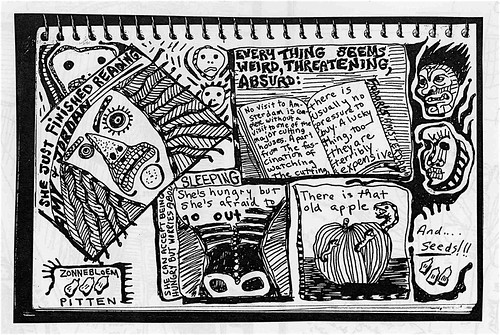Today, my iPod Shuffle arrived, and I adore it, as blogged
here. You may remember
I bought it to fill with music that would help me read and study without distraction, and I solicited advice from readers about what they thought would fit this need. I've already
noted some preliminary suggestions, including a warning against classical music, the theory being that it's too complex and interesting, which makes it distracting. Clearly, you don't want to study while listening to Beethoven's Ninth Symphony, but I think there are some good classical choices. One reader writes:
In response to your e-mailer who suggested that classical music is too distracting to read by: presumably that depends a great deal on the individual reader/listener. I, personally, am distracted by schlocky music. Most contemporary movie soundtracks would have me yanking off my earphones and begging the barista to chat me up. The thing I love about Chopin (for example) is that, while it has a deep, complex musical structure and emotional texture, it doesn't have any of the insistent qualities that demand that you focus your immediate, conscious attention on it at every moment (like a driving beat, or an incessant rhythm or lyric, or a rigid structure). Last week in the library I read two books and skimmed three more in two and a half hours while listening to Rubinstein play Chopin, and my concentration never wavered. I can rarely sustain that level of concentration for that long, and I credit the music for helping to maintain my interest and focus.
In fact, I have
this CD already, and I put the only the slower pieces on my "Reading Music" playlist. Here's another email with classical suggestions:
My taste might be more vanilla than you're looking for, but I often study listening to Chopin's nocturnes, Schubert's impromptus, and Vanessa-Mae's classical work. A good Chopin CD is Jean Yves Thibaudet's "The Chopin I Love"; there's quite a bit on that CD, including the E-flat major nocturne, which is my absolute favorite. For Schubert, the Wanderer Fantasy CD is very nice, especially if you can find the one played by Leon Fleisher. Actually, most of Leon Fleisher's piano work is wonderful. And Vanessa-Mae--her Original Four Seasons CD is very nice. It has the Vivaldi pieces but also her own work, the Devil's Trill Sonata, which is fantastic. Her CD Violin Player is also probably good, but I don't have that one. I do have Storm, which is interesting--she is a beautifully talented violinist who likes to fuse classical music with more modern work. She combined Bizet's Can-Can with a driving techno beat, and that worked quite well. But some of her other pieces on that CD are a little annoying--Bach just shouldn't be combined with a synthesizer or electric guitar line.
Here's another:
I find that the Hilliard Ensemble's "Morimur" is great to read to. (It's on ECM New Series.) The recording was inspired by the research of Helga Thoene, a musicologist who argues that Bach alluded to chorales in the Chaconne from the second partita for solo violin. So the recording presents several chorales (in German) and the partita, followed by a reconstruction of the Chaconne with singers emphasizing the chorale melodies. (Of course, you can't go wrong with Bach for stringed instruments, either: the 'cello suites, the sonatas and partitas for solo violin, and the lute music -- there is also a very fine, recent release of Segovia Bach transcriptions on Deutsche Grammophon.)
I have a lot of Bach on CD and am putting a good portion of that into the Shuffle. Someone recommended Schubert's "
Wanderer Fantasy," which I had.
Another of the "preliminary suggestions" noted in the earlier post was movie soundtracks. As that emailer above indicates, many film soundtracks are bombastic and inappropriate for my purpose, but from my existing CD collection, I chose the
Philip Glass soundtrack from "Kundun." Although I haven't ordered any of these, here are some specific soundtracks that were recommended:
"Ghost in the Shell 2," "The Last of the Mohicans," "Cinema Paradiso."
Another recommendation noted in the "preliminary suggestions" post was Brian Eno's ambient music, particularly "
Music for Airports." I've ordered that, along with Eno's "
Ambient 4: On Land" -- a classic example of making a second purchase to earn the free shipping.
Now, for some extra stuff. One emailer pointed me to this list of
music featured on The Weather Channel. A couple people recommended
Sigur Ros -- which sounds great. Another interesting idea is "
True Love Waits: Christopher O'Riley Plays Radiohead" ("Radiohead consistently produces very complex melodies and this works surprisingly well. Classically they fall into the 'Romantic' camp. Very Debussy.") One emailer suggested Miles Davis, specifically "
Kind of Blue" and "
Sketches of Spain." Someone recommended
Aphex Twin. Someone recommended Ottmar Liebert. ("He plays 'nuevo flamenco,' some of the most beautiful and interesting classical guitar you’ve ever heard. Perfect background for reading or just thinking. Or in my case, for coding :)")
From my CD collection, I pulled out a lot of early music. I have had very good reading success with
this CD in the past, so it went right in. And I had
these two Hildegard von Bingen chant recordings. I put in some
Monteverdi.
One more email:
It may be rather SNAGy (Sensitive New Age Guy) of me to mention this, but there is, in fact, a lot of so-called New Age music that is not overly cheesy and quite relaxing. I read and write to George Winston, Michael Jones (solo piano), David Lanz and/or Paul Speer (they collaborated), among others. A lot of it is the sort of pretentious 'Toltec Magician' (I kid you not) crap, but there are also some halfway decent composers out there. I subscribed to Real's Rhapsody service, which is pretty cheap for streaming audio, and they have a New Age stream where I get some ideas. A bunch are available on iTunes.
Anyway, that's enough for now!





